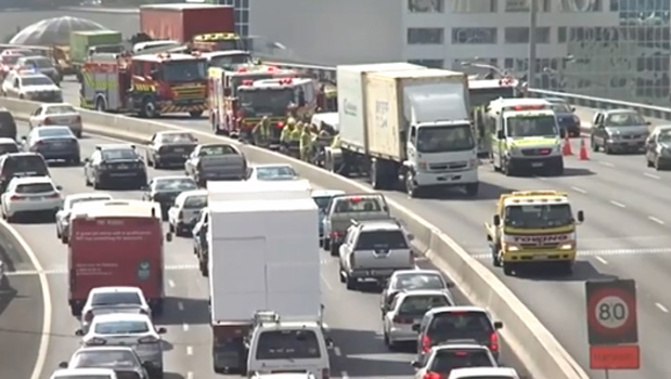
Choked roads and worsening congestion have led to an "increasing sense of desperation" for Auckland motorists, with rush-hour traffic jams now spilling over to off-peak times, the Automobile Association warns.
"There's this sense that the peak is just getting wider and wider," AA Auckland issues spokesman Barney Irvine told the Herald.
"Arguably that's when congestion gets really bad, when the off-peak just gets smaller and smaller until eventually you don't have one - it's just bad all the time."
His comments follow today's release of a biennial OECD New Zealand economic survey report that calls for tolls and congestion charges to counter growing traffic gridlock that is estimated to cost the Auckland economy $1.25 billion each year in lost productivity.
The report blames decades of under-investment in critical infrastructure for the city's severe roading problems. It calls for a mix of tolls and congestion charges to alleviate peak-hour traffic pressure and help fund new roads and more public transport.
"Placing a cost on travel during peak periods could incentivise drivers to travel at different times (off-peak), if they are not required to be on the roads, or could encourage more carpooling and use of public transportation," the report says.
Mr Irvine said the majority Auckland commuters were prepared to pay more to fix the city's roading problems and were sick of sitting in endless queues on clogged motorways or arterial routes.
"There certainly appears to be a recognition that if we're going to deal with this congestion issue we are going to have to pay a bit more.
"[Congestion's] something that affects everybody, it's something you feel powerless in the face of and it's something that is and feels like it is continually getting worse."
Auckland Council proposed a motorway toll last year or a regional fuel tax to plug a $12 billion transport funding gap over the next 30 years. A toll of $2 was estimated to cost the average household $350 a year. But the Government does not support the move so the council has instead introduced a targeted rate.
Auckland Mayor Len Brown told the Herald today's OECD report confirmed what we already knew.
"Decades of under-investment in our transport infrastructure is costing our businesses and impacting how we move around and enjoy our city. I am pleased to see we have independently arrived at the same solution to this problem, that the most effective way to reduce congestion would be through a motorway user charge."
Mr Brown said Auckland Council had just completed its largest conversation with Aucklanders about the options for improving the transport network across the region.
"The majority of the more than 30,000 respondents agreed that they were willing to pay extra, preferably through a motorway charge, to invest in a more effective transport network that would decongest roads and provide faster, more reliable public transport options."
He was now in discussions with central government to find agreement on how Auckland could raise its alternative transport funding.
"... we know Aucklanders want us to start investing now, particularly in public transport, so we have introduced an interim transport levy to pay for an Accelerated Transport Programme that includes additional investment of $523 million over the next three years to help us finally get this city moving."
Mr Irvine commended the council for "starting the debate" but said AA could not support a plan that did not have the backing of central government.
"The idea of developing a 30-year transport programme for Auckland where central government is at a fundamental level in disagreement with local government, that's just not the right platform."
He said sufficient "lead in time" was necessary to garner public support and ensure the strategy achieved the best outcomes. He cited London, which took 30 years to reach the stage Auckland was at now of proposing a congestion charge system.
"The idea that we might be able to achieve something like this in two or three years, we're just not comfortable with that at all."
He added that London had much better public transport than Auckland, giving its commuters better options if they chose to ditch vehicles to dodge congestion charges or tolls.
The report says Auckland is the second most congested city in Australasia behind Sydney.
Take your Radio, Podcasts and Music with you








